I choose to live without violence
A powerful rally kicks off Albania’s national campaign against domestic violence, part of nationwide activities to launch the global 16 Days of Activism against Gender-Based Violence.Date:
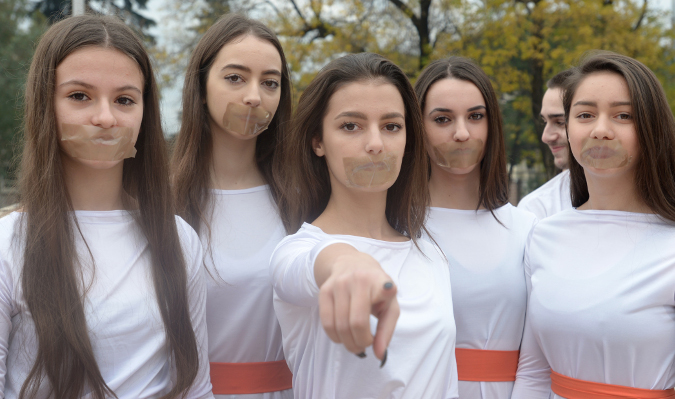
“Our problems started the second day of our marriage. He’d come home drunk, at 2am, screaming. This was his usual behaviour, I didn’t know who to approach; I felt no one would believe me. I tried hard to change him, but it was impossible,” a domestic violence survivor told hundreds of rapt Albanians and international representatives at the opening of I choose to live without violence, Albania’s national campaign against domestic violence, in the capital, Tirana.
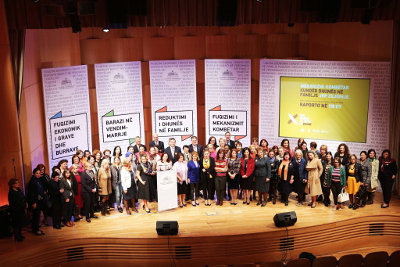
Held on 25 November, the International Day for the Elimination of Violence against Women, the “I choose to live without violence” event called on women and girls, men and boys to speak up and report gender based violence and domestic violence. It kicked off Albania’s activities for the global 16 Days of Activism against Gender-Based Violence, which galvanizes action to end violence against women and girls and ends 10 December, Human Rights Day.
At the event, Albania’s Minister of Social Welfare and Youth, Mr. Blendi Klosi, promised that every woman and girl’s report would be properly addressed by law, and that victims would receive counselling, economic rehabilitation and be fully integrated into the society.
Prominent journalists, civil society activists and international representatives participated, pledging to prevent, report and raise awareness of domestic violence and to advocate for better laws and for access to specialized services for domestic violence victims.
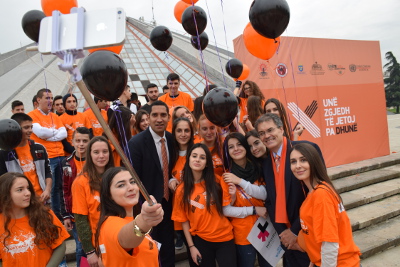
The UN Women representative in Albania, Mr. David Saunders, gave a strong message to men and boys in the audience: “Your attitudes, your actions, your influence can change social norms. You will make gender equality and elimination of violence against women a reality. I am humbled that nearly 6,000 men and boys in Albania have joined the HeForShe movement, to fight gender stereotypes and empower women,” said
Mr. Johan Ndisi, Sweden’s ambassador to Albania, noted: "It’s a common misconception that gender-based violence is a women’s issue. But in fact, it is us – men and boys – who are the most important actors to take a stance against violence against women and to make a change."
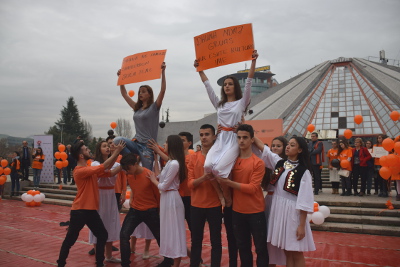
In a corner of the main square, at the Academy of Arts, students, youth and religious representatives presented an art installation with messages against gender-based violence. On the capital’s main boulevard, hundreds of girls and boys gathered to share messages to end violence against women. Young students from the National High School of Choreography held a special dance performance.
A violation of fundamental human rights with grave physical, sexual and psychological violence against women in Albania is common, with almost 60 per cent of women aged 18-55 having experienced domestic violence. In 2016, the number of domestic violence cases reported increased by 11 per cent from 2015.
The Tirana events were among the many planned by the Ministry of Social Welfare and Youth in partnership with UN Women, UNDP and UNFPA and with the financial support of the Government of Sweden for the International Day for the Elimination of Violence Against Women and to support the 16 days of activism campaign.
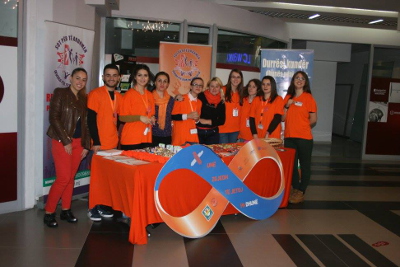
In Durres, Pogradec and Korça, civil society organizations joined the global call to raise funds to end violence against women. In response to the call, citizens contributed clothes for needy people and bought promotional materials handcrafted by NGOs.
Although a high government priority, domestic violence prevention, protection, prosecution and referral mechanisms remain weak, though improving. Recently, the Committee on the Elimination of Discrimination against Women (CEDAW), recommended that Albania continue to conduct public awareness campaigns to combat gender-based violence.
At the event, Minister Klosi presented the new five-year National Strategy on Gender Equality and the Action Plan, a priority of the Albanian government. Prepared with assistance from UN Women and UNDP in Albania and supported by the Swedish Government, the strategy’s main priorities are:
- Economic empowerment of women and men
- Equal participation in decision-making
- Reducing gender-based violence and domestic violence
- Strengthening the National Gender Equality Mechanism.